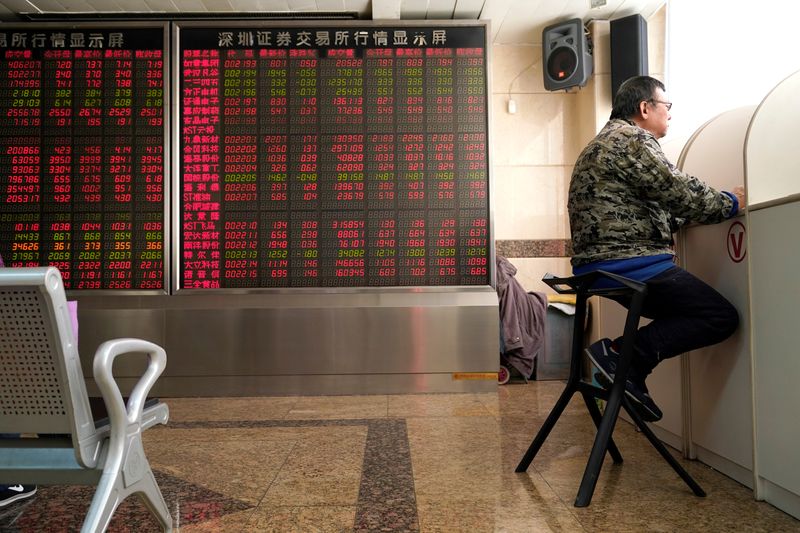This post was originally published on this site
https://i-invdn-com.akamaized.net/trkd-images/LYNXMPEG1603S_L.jpg
By Tom Westbrook
SINGAPORE (Reuters) – A mid-week rally in Asian share markets halted on Friday and oil prices steadied as the growing death toll and economic damage from a new virus spreading from China curbed further gains.
The death toll in mainland China rose to 636, more than doubling in just under a week, with the number of infections at 31,161.
One of the first Chinese doctors who raised the alarm about the coronavirus also died from the illness at a Wuhan hospital in the early hours of Friday. He was 34.
MSCI’s broadest index of Asia-Pacific shares outside Japan () eased 0.5% on Friday as the lingering anxiety over the virus outbreak tempered the mood, though it is still up 3.2% for the week.
Japan’s Nikkei () and Korea’s Kospi () headed lower in morning trade, but are on track for their best week of the year after earlier rises.
The rally in global stocks since Monday’s wipeout of Chinese equities, and the selldown in bonds, was underpinned by China’s sweeping efforts to contain the spread of the virus.
Beijing has pumped billions of dollars into the money market to stabilize market confidence and support its faltering economy. Thursday’s news of Chinese tariff cuts on some U.S. goods had also fired up riskier assets.
But with the death toll rising, cities shut off, flights canceled and factories closed, global supply chains are in disarray and fears of a pandemic remain. Chinese stocks also sit well below
“The rate of infection is not slowing,” said Michael McCarthy, chief markets strategist at brokerage CMC Markets in Sydney.
“I’m a little surprised at the way European and U.S. investors have shrugged this off. I think the reaction in the Asia-Pacific region is much more reasonable. There is real uncertainty,” he said.
In morning trade a slide in the safe-haven yen paused, leaving the currency sitting by a two-week low at 109.98 per dollar and poised for its worst weekly loss since last October.
Gains in the Australian dollar , a liquid proxy for China because of the heavy exposure of Australian exports, were likewise halted. It is on track for its first weekly rise this year. Gold hovered at $1,565.76 per ounce .
Chinese goods trade figures due during the morning will be closely watched for an early glimpse of how the virus, and the harsh measures to contain it, are affecting the flow of goods.
COMMODS CAUTIOUS
Much is unknown about the coronavirus, including its lethality and transmission routes. The World Health Organization has said it is too early to call a peak in the outbreak.
Yet China’s aggressive response, dubbed a “people’s war for epidemic prevention” by President Xi Jinping, appears to have inspired confidence.
Overnight, bonds were sold and markets rallied from Frankfurt to New York. U.S. stocks gained for a fourth straight session and Wall Street’s main indexes hit record highs. The S&P 500 () rose 0.3%.
Owing to much greater exposure to Chinese demand and less access to the benefits of monetary stimulus, commodity prices have been much more sensitive to conditions on the ground.
Oil and metal prices fell hard as the coronavirus outbreak gained pace and have been slow to recover.
U.S. crude () was firm on Friday at 51.37 per barrel, but is flat for the week and remains 13% below its Jan. 21 level. prices settled at $55.12 per barrel.
A rally in – often seen as a barometer of global economic health because of its wide industrial use – ran out of steam on Thursday and closed flat in London at $5,735-a-tonne .
“We think that demand could come back strongly as opposed to gradually in Q2 2020,” said Commonwealth Bank commodities analyst Vivek Dhar.
“But the risk in the near term is that provinces take longer to return to work in order to contain the spread of the virus.”

